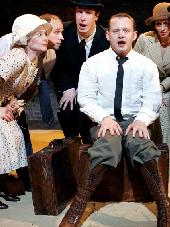SITE GUIDE
SEARCH
REVIEWS
FEATURES
NEWS
Etcetera and
Short Term Listings
LISTINGS
Broadway
Off-Broadway
NYC Restaurants
BOOKS and CDs
OTHER PLACES
Berkshires
London
California
New Jersey
DC
Philadelphia
Elsewhere
QUOTES
TKTS
PLAYWRIGHTS' ALBUMS
LETTERS TO EDITOR
FILM
LINKS
MISCELLANEOUS
Free Updates
Masthead
Writing for Us
A CurtainUp  London Review
London Review
 London Review
London ReviewTake Flight
|
What is this impulse that drives otherwise sane men to attempt the impossible?
---- Otto Lilienthal |

Michael Jibson as Charles Lindbergh and members of the Company
(Photo: Tristram Kenton) |
Nowadays flight for the masses is associated with one's carbon footprint and the destruction of the planet and the necessary discomfort for mass tourists to get fast to faraway places. Last weekend, London was hosting the Red Bull Air Race, a speed and agility challenge for pilots undergoing daredevil aerobatics and enduring extremes of G force. A few months ago we were at Biggin Hill in Kent for the Air Show acrobatics. Both events are immensely popular and serve to remind us of the miracle of flight. Take Flight attempts to take us back to those early days, when for man to take off at all, was a wonder.
John Weidman's book takes three sets of aeronautical innovators and interweaves their stories. The Wright Brothers, Wilbur and Orville (Sam Kenyon and Elliot Levey), discuss scientific first principles on the sandy Outer Banks of North Carolina. They sing about "Equilibrium" and sand flies. Charles Lindbergh (Michael Jibson) seems to stumble into becoming the most famous pilot of all time and Amelia Earheart (Sally Ann Triplett) is driven with aeronautical ambition to be the first and most famous woman flier.
In dramatic terms, the Wright Brothers are the comedians of the musical. As inventors they form a slightly barmy double act in their felt hats and tweed suits. Amelia gives us the love interest with her devoted husband George Putnam (Ian Bartholomew) torn between letting her achieve her ambition and knowing that with the risks she takes, he may lose her. Charles Lindbergh is this curiosity, a solo pilot and seemingly a loner which, in Michael Jibson's remarkable soulful portrayal, gives the audience a sense of the isolation of those long solo flights. We see too his trek round the bankers looking for a backer.
The minimal staging leaves much to the imagination. The pilots mount step ladders and packing cases and act their socks off. When Amelia Earheart flies round the world, a red ribbon is zigzagged across the stage like the red line on a map of the world. Maybe we needed some shots of the vastness of the burning blue yonder.
The performances are flawless and the singing is superb. Sally Anne Triplett dons her leather flying jacket and sings her heart out. Her duets with George Putnam (Ian Bartholomew) take off. I was much taken with the little boy lost gaze of Michael Jibson's Lindbergh as he sits pale faced, impassive and endearing in the cockpit of his plane. Elliot Levey and Sam Kenyon provide a comedy duo as they grapple with first principles, "We don't have lives" and "How can we be wrong? We're the Wright Brothers!" they pun. Clive Carter plays Otto Lilienthal who died testing a flying machine.
Putnam and Amelia's song "Earthbound" is the tune you will remember, a beautiful love ballad which has show stopping potential. Many of the other tunes are rather samey but some have a fresher jazzy feel and the comedy songs give variety. The Wright Brothers' "The Funniest Thing" is accompanied by Wilbur playing a small banjo for a period touch and their numbers tend to have lots of comic percussion, some of the lyrics being spoken rather than sung.
It is rather engaging to have a musical which has a theme one can engage with intellectually. I think given some investment, Take Flight could continue its journey elsewhere, but it is still a work in progress.
|
TAKE FLIGHT
Book by John Weidman Music by David Shire Lyrics by Richard Maltby, Jr Directed by Sam Buntrock Starring: Sally Ann Triplett, Michael Jibson, Elliot Levey, Sam Kenyon, Ian Bartholomew, Clive Carter With: Christopher Colley, Ian Conningham, John Conroy, Helen French, Edward Gower, Kaisa Hammarlund, Liza Pulman Design: David Farley Orchestrations: David Shire Lighting Design: David Howe Sound Design: Sebastian Frost Musical Director and Supervisor: Caroline Humphris Musical Staging: Sam Spencer-Lane Running time: Two hours 30 minutes with one interval Box Office: 020 7907 7060 Booking to 22nd September 2007 Reviewed by Lizzie Loveridge based on 31st July 2007 performance at Menier Chocolate Factory, 53 Southwark Street London SE1 (Rail/Tube: London Bridge) Musical Numbers Act One
|




